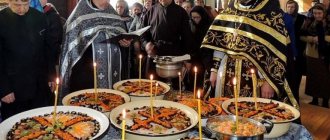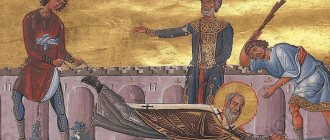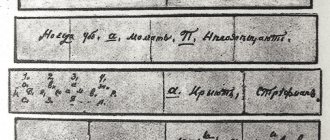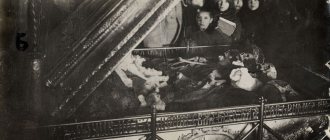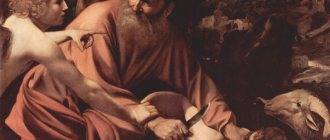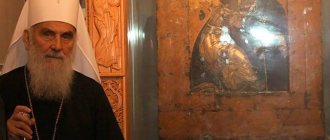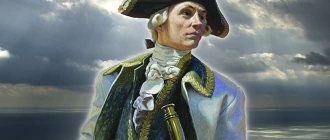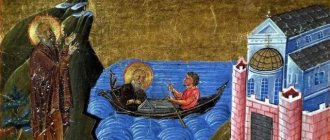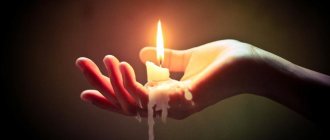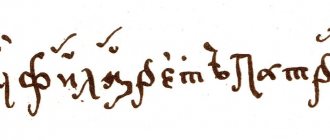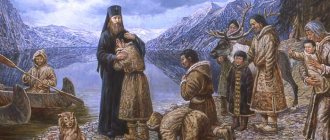Russian Orthodox Church
Born in Kanli, Kasteli Chania province in 1954. As a child, he lived with his family in Tilis, Agies Paraskies, and Heraklion on the island of Crete.
After graduating from high school, he studied at the Risari church school in Athens; Graduated from the Faculty of Theology at the Aristotle University of Thessaloniki with a Master's degree. He also studied art history, literature and philosophy in Odessa.
In 1973 he took monastic vows at the Ankarat Monastery. He continued his studies at Aristotle University at the Faculty of Theology.
In 1975 he was ordained deacon at the Spili Monastery. He held the position of protosingel (secretary) of the Lambian and Sfakian Metropolis in Crete. He actively participated in preaching and philanthropic activities.
In 1985-1990 was in Odessa as exarch of the Patriarch of Alexandria in Russia, where his flock were the Greeks of the former Soviet Union.
He founded the School of Greek Culture and the Filiki Etherea Museum for 600 children, where the Greek language is taught.
In 1990, he was consecrated bishop with the title “Cyrinus” and appointed Patriarchal Representative of the Patriarchate of Alexandria in Athens. He always accompanied Patriarch Parthenius on trips to Africa and at many international and theological conferences.
In 1996 he was appointed Patriarchal Vicar in Alexandria.
In September 1997, he was elected Metropolitan of Cameroon and Central Africa. In subsequent years, he became known as a shepherd who made an enormous contribution to the apostolic ministry to the peoples of Cameroon, Chad, Guinea, Ecuador, Gabon and the St. Thomas Islands.
In 2002, he was elected Metropolitan of Zimbabwe, and the works of the apostolic ministry from central-western Africa were transferred south to the lands of Zimbabwe, Angola, Mozambique, Botswana, and Malawi. Founded 4 missionary centers in Harare, a Greek cultural center for 400 delegates, 2 large missionary centers in Malawi, a hospital, a technical school and a nursing school. With the support of the Greek Parliament, he renovated the Greek Square (school, temple, bishop's residence) in Beira, Mozambique. He founded and handed over temples to the Greek communities in Botswana and Angola.
On October 9, 2004, he was elected as the 116th Patriarch of Alexandria and All Africa. The enthronement ceremony took place at the Cathedral of the Annunciation of the Blessed Virgin Mary in Alexandria on October 24, 2004.
Title of Primate: His Beatitude the Pope and Patriarch of the Great City of Alexandria, Libya, Pentapolis, Ethiopia, all Egypt and all Africa, Father of Fathers, Shepherd of Shepherds, Bishop of Bishops, Thirteenth Apostle and Judge of the Universe .
The patriarchal residence is located in Alexandria (Egypt).
***
On November 8, 2022, during the Divine Liturgy in Cairo, Patriarch Theodore of Alexandria remembered at the great entrance, among the Primates of the autocephalous Orthodox Churches, the head of the so-called Orthodox Church of Ukraine and officially announced his recognition of this non-canonical structure.
During the meeting of the Holy Synod of the Russian Orthodox Church, held on December 26, the participants noted that the decision to recognize the schismatic structure operating in Ukraine was not made at the meeting of the Holy Synod of the Patriarchate of Alexandria on October 7-9, was not put to a vote of its bishops and had a conciliar character, but was accepted by the Primate of this Church individually.
Members of the Holy Synod of the Synod of the Russian Orthodox Church confirmed the impossibility of commemorating the name of Patriarch Theodore of Alexandria in diptychs, as well as prayerful and Eucharistic communion with him. At the same time, it was decided to maintain church communion with the bishops of the Alexandrian Orthodox Church, except for those who supported or in the future will support the legalization of the Ukrainian schism.
Awards
- Order of Friendship (Russia, September 17, 2009) - for great contribution to the development of cooperation between the Russian Federation and the Arab Republic of Egypt
[5] - Order of Prince Yaroslav the Wise, 1st degree (Ukraine, July 27, 2013) - for outstanding church activities aimed at raising the authority of Orthodoxy in the world, and on the occasion of the celebration in Ukraine of the 1025th anniversary of the baptism of Kievan Rus
[6] - Order of the Holy Equal-to-the-Apostles Grand Duke Vladimir, 1st degree (ROC, 2007)[7].
- Order of Glory and Honor, 1st degree (ROC, 2013)[8]
- Order of the UOC-MP of Saints Anthony and Theodosius of Kiev-Pechersk, 1st degree (2007).[9].
- Golden Order of St. George (Georgian Orthodox Church, 2008)[10]
- Prize named after Patriarch Alexy II “For outstanding activity in strengthening the unity of Orthodox peoples. For the affirmation and promotion of Christian values in the life of society" (2012)[11].
Excerpt characterizing Theodore II (Patriarch of Alexandria)
From the flush they drove even further to the left along a road winding through a dense, low birch forest. In the middle of this forest, a brown hare with white legs jumped out onto the road in front of them and, frightened by the tramp of a large number of horses, he was so confused that he jumped along the road in front of them for a long time, arousing everyone’s attention and laughter, and only when several voices shouted at him, rushed to the side and disappeared into the thicket. After driving about two miles through the forest, they came to a clearing where the troops of Tuchkov’s corps, which was supposed to protect the left flank, were stationed. Here, on the extreme left flank, Bennigsen spoke a lot and passionately and made, as it seemed to Pierre, an important military order. There was a hill in front of Tuchkov’s troops. This hill was not occupied by troops. Bennigsen loudly criticized this mistake, saying that it was crazy to leave the height commanding the area unoccupied and place troops under it. Some generals expressed the same opinion. One in particular spoke with military fervor about the fact that they were put here for slaughter. Bennigsen ordered in his name to move the troops to the heights. This order on the left flank made Pierre even more doubtful of his ability to understand military affairs. Listening to Bennigsen and the generals condemning the position of the troops under the mountain, Pierre fully understood them and shared their opinion; but precisely because of this, he could not understand how the one who placed them here under the mountain could make such an obvious and gross mistake. Pierre did not know that these troops were not placed to defend the position, as Bennigsen thought, but were placed in a hidden place for an ambush, that is, in order to be unnoticed and suddenly attack the advancing enemy. Bennigsen did not know this and moved the troops forward for special reasons without telling the commander-in-chief about it. On this clear August evening on the 25th, Prince Andrei lay leaning on his arm in a broken barn in the village of Knyazkova, on the edge of his regiment’s location. Through the hole in the broken wall, he looked at a strip of thirty-year-old birch trees with their lower branches cut off running along the fence, at an arable land with stacks of oats broken on it, and at bushes through which the smoke of fires—soldiers’ kitchens—could be seen. No matter how cramped and no one needed and no matter how difficult his life now seemed to Prince Andrei, he, just like seven years ago at Austerlitz on the eve of the battle, felt agitated and irritated. Orders for tomorrow's battle were given and received by him. There was nothing else he could do. But the simplest, clearest thoughts and therefore terrible thoughts did not leave him alone. He knew that tomorrow's battle was going to be the most terrible of all those in which he participated, and the possibility of death for the first time in his life, without any regard to everyday life, without consideration of how it would affect others, but only according to in relation to himself, to his soul, with vividness, almost with certainty, simply and horribly, it presented itself to him. And from the height of this idea, everything that had previously tormented and occupied him was suddenly illuminated by a cold white light, without shadows, without perspective, without distinction of outlines. His whole life seemed to him like a magic lantern, into which he looked for a long time through glass and under artificial lighting. Now he suddenly saw, without glass, in bright daylight, these poorly painted pictures. “Yes, yes, these are the false images that worried and delighted and tormented me,” he said to himself, turning over in his imagination the main pictures of his magic lantern of life, now looking at them in this cold white light of day - a clear thought of death. “Here they are, these crudely painted figures that seemed to be something beautiful and mysterious. Glory, public good, love for a woman, the fatherland itself - how great these pictures seemed to me, what deep meaning they seemed filled with! And all this is so simple, pale and rough in the cold white light of that morning, which I feel is rising for me. Three major sorrows of his life in particular occupied his attention. His love for a woman, the death of his father and the French invasion that captured half of Russia. “Love!.. This girl, who seemed to me full of mysterious powers. How I loved her! I made poetic plans about love, about happiness with it. Oh dear boy! – he said out loud angrily. - Of course! I believed in some kind of ideal love, which was supposed to remain faithful to me during the whole year of my absence! Like the tender dove of a fable, she was to wither away from me. And all this is much simpler... All this is terribly simple, disgusting! My father also built in Bald Mountains and thought that this was his place, his land, his air, his men; but Napoleon came and, not knowing about his existence, pushed him off the road like a piece of wood, and his Bald Mountains and his whole life fell apart. And Princess Marya says that this is a test sent from above. What is the purpose of the test when it no longer exists and will not exist? will never happen again! He's gone! So who is this test for? Fatherland, death of Moscow! And tomorrow he will kill me - and not even a Frenchman, but one of his own, just as yesterday a soldier emptied a gun near my ear, and the French will come, take me by the legs and head and throw me into a hole so that I don’t stink under their noses, and new conditions will arise. lives that will also be familiar to others, and I will not know about them, and I will not exist.” He looked at the strip of birch trees with their motionless yellow, green and white bark, glistening in the sun. “To die, so that they would kill me tomorrow, so that I wouldn’t exist... so that all this would happen, but I wouldn’t exist.” He vividly imagined the absence of himself in this life. And these birches with their light and shadow, and these curly clouds, and this smoke from the fires - everything around was transformed for him and seemed something terrible and threatening. A chill ran down his spine. Quickly getting up, he left the barn and began to walk. Voices were heard behind the barn. - Who's there? – Prince Andrei called out. The red-nosed captain Timokhin, the former company commander of Dolokhov, now, due to the decline of officers, a battalion commander, timidly entered the barn. Behind him came the adjutant and the regimental treasurer. Prince Andrei hastily stood up, listened to what the officers had to convey to him, gave them some more orders and was about to let them go, when a familiar, whispering voice was heard from behind the barn. - Que diable! [Damn it!] - said the voice of a man who bumped into something. Prince Andrei, looking out of the barn, saw Pierre approaching him, who tripped on a lying pole and almost fell. It was generally unpleasant for Prince Andrei to see people from his world, especially Pierre, who reminded him of all those difficult moments that he experienced on his last visit to Moscow. - That's how! - he said. - What destinies? I didn't wait. While he was saying this, in his eyes and the expression of his whole face there was more than dryness - there was hostility, which Pierre immediately noticed. He approached the barn in the most animated state of mind, but when he saw the expression on Prince Andrei’s face, he felt constrained and awkward. “I arrived... so... you know... I arrived... I’m interested,” said Pierre, who had already senselessly repeated this word “interesting” so many times that day. “I wanted to see the battle.” - Yes, yes, what do the Masonic brothers say about the war? How to prevent it? - said Prince Andrei mockingly. - Well, what about Moscow? What are mine? Have you finally arrived in Moscow? – he asked seriously. - We've arrived. Julie Drubetskaya told me. I went to see them and didn’t find them. They left for the Moscow region. The officers wanted to take their leave, but Prince Andrei, as if not wanting to remain face to face with his friend, invited them to sit and drink tea. Benches and tea were served. The officers, not without surprise, looked at the thick, huge figure of Pierre and listened to his stories about Moscow and the disposition of our troops, which he managed to travel around. Prince Andrei was silent, and his face was so unpleasant that Pierre addressed himself more to the good-natured battalion commander Timokhin than to Bolkonsky. - So, did you understand the entire disposition of the troops? - Prince Andrei interrupted him. - Yes, that is, how? - said Pierre. “As a non-military person, I can’t say that I completely, but I still understood the general arrangement.” “Eh bien, vous etes plus avance que qui cela soit, [Well, you know more than anyone else.],” said Prince Andrei. - A! - Pierre said in bewilderment, looking through his glasses at Prince Andrei. - Well, what do you say about the appointment of Kutuzov? - he said. “I was very happy about this appointment, that’s all I know,” said Prince Andrei. - Well, tell me, what is your opinion about Barclay de Tolly? In Moscow, God knows what they said about him. How do you judge him? “Ask them,” said Prince Andrei, pointing to the officers. Pierre looked at him with a condescendingly questioning smile, with which everyone involuntarily turned to Timokhin. “They saw the light, your Excellency, as your Serene Highness did,” Timokhin said, timidly and constantly looking back at his regimental commander. - Why is this so? asked Pierre. - Yes, at least about firewood or feed, I’ll report to you. After all, we were retreating from the Sventsyans, don’t you dare touch a twig, or some hay, or anything. After all, we are leaving, he gets it, isn’t it, your Excellency? - he turned to his prince, - don’t you dare. In our regiment, two officers were put on trial for such matters. Well, as His Serene Highness did, it just became so about this. We saw the light...
Links
Archbishops (325–451) Alexander I • Athanasius • Pistus • Gregory • George • Lucius • Peter II • Timothy I • Theophilus • Cyril Patriarchs (from 451) Dioscorus<mfz> • Proterius • Timothy II<mphz> • Timothy III • Peter III<mphz> • John I • Athanasius II • John II<мфз> • John III<мфз> • Dioscorus II<мфз> > • Timothy IV<мфз> • Theodosius I<мфз> • Gaina (Gaian)<у> • Paul • Zoilus • Apollinaris • John IV • Eulogius • Theodore I (Theodosius) • John V • George I • Cyrus< mfl> • Peter IV<mfl> • John VI • Eutyches I • Peter V • Peter VI • Cosmas I • Politianus • Eustathius • Athanasius II • Christopher I • Sophronius I • Michael I (Siail) • Michael II • John VII • Christodoulus • Eutyches II • Sophronius II • Isaac • Job (James I) • Ilia I • Ilia II • Arsenius • Philotheus I (Theophilus) • George II • Leontius • Alexander II • John VIII • Savva • Theodosius II • Cyril II • Eulogius II • Sophronius III • Ilia III • Eleutherius (Alfter) • Mark III • Nicholas I • Gregory I • Nicholas II • Athanasius III • Gregory II • Gregory III • Niphont • Mark IV • Nicholas III • Gregory IV • Nicholas IV • Athanasius IV • Mark V • Philotheus I • Mark VI • Gregory V • Joachim I • Philotheus II • Gregory VI • Sylvester • Meletius I • Cyril III • Gerasim I • Mitrophanus • Nicephorus • Ioannikios • Paisios • Joachim II • Parthenius I • Gerasim II • Samuel • Cosmas II • Cosmas III • Matthew • Cyprian • Gerasim III • Parthenius II • Theophilos II • Hierotheos I • Artemios • Hierotheos II • Kalinikos • James II • Nicanor • Nilus • Sophronius IV • Photius • Meletius II • Nicholas V • Christopher II • Nicholas VI • Parthenius III • Peter VII • Theodore II <ap70> - apostle from 70 <a> - Arians <мфз> - monophysites <мфл> - monothelites <у> - Julianists
Recommendations
- "AngolaPress - News". www.angolapress-angop.ao. Retrieved 2008-05-12.[ permanent dead link
] - His Beatitude Patriarch Theodore II of Alexandria (Blessed Patriarch Theodore II of Alexandria) Retrieved 28 Feb 2022.
- The enthronement of the newly elected Primate of the Alexandrian Orthodox Church took place (in Russian) Archived 2018-02-28 in the Wayback Machine Retrieved February 28, 2022.
- “The Patriarchate of Alexandria recognizes the Autocephalous Church of Ukraine (UPD).” Orthodox times
. 2019-11-08. Retrieved 2019-11-08. - “Letter from Patriarch Theodore to the bishops on the recognition of Ukrainian autocephaly.” Orthodox times
. 2019-11-08. Retrieved 2019-11-08. - “The Holy Synod took action in connection with the recognition by the Primate of the Patriarchate of Alexandria of the schismatic structure in Ukraine.” patriarchia.ru
(in Russian). December 26, 2022. Retrieved 2019-12-26. - “The Russian Orthodox Church interrupts communication with the Patriarch of Alexandria in connection with their recognition of the OCU - decision of the Synod.” risu.org.ua.
_ December 26, 2022. Retrieved 2019-12-28. - “It is impossible for the Russian Orthodox Church to further commemorate the Patriarch of Alexandria.” www.interfax-religion.ru
. 2019-11-08. Retrieved 2019-11-08. - The primates of the Alexandrian and Russian Orthodox Churches presented each other with church awards. Retrieved February 28, 2022.
- A meeting took place between His Holiness Patriarch Kirill and the Primate of the Alexandria Orthodox Church. Retrieved February 28, 2022.
- The Patriarch of Alexandria was awarded the highest award of the Georgian Orthodox Church. Retrieved February 28, 2022.
- A fraternal conversation took place between the Primate of the Russian Orthodox Church and His Beatitude Patriarch Theodore of Alexandria. Retrieved February 28, 2022.
- Patriarch of Alexandria Theodoros II was awarded the Order of the Grand Cross of the Apostle Mark by Serbian President Aleksandar Vucic. Patriarch Theodore II was awarded a high state order. Retrieved February 28, 2022.
- “DESPITE THE FACT THAT I HAVE A TIARA ON MY HEAD AND A PANAGIUS ON MY CHEST, I REMAIN A MISSIONARY AT MY HEART.” PATRIARCH THEODOR II VISITED THE SPIRITUAL ACADEMY Retrieved February 28, 2022.
